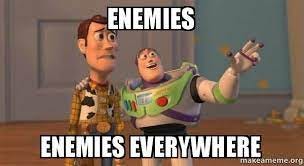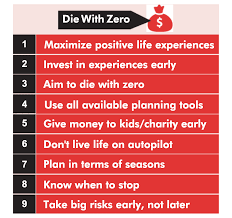The Best Pitch Deck, Artificial Enemies, and Dying with Zero
Hey there,
Hope you’ve had a solid week. Quick reminder on two things -
I’m looking to start a small mastermind group of veteran business owners. Monthly meets to learn from others and their industry, get accountability for continuing to grow, and a place to discuss wins, losses, and struggles. If that is interesting to you, reply to this email and I’d love to chat with you.
A popular LA real estate investor, Moses Kagan, has a heart for vets. This last week, he announced he’s doing a private webinar for vets about how to get into private real estate transactions, FREE. I’ll be attending and if you have any interest in RE, it would be worthwhile to check out. Here’s the thread with the signup on Twitter.
 OK, going forward w this service members & veterans real estate webinar. (No agenda on my end, except to do something helpful for people I admire.) Goal: De-mystify the business of doing private real estate deals, discuss some ways into the biz, & answer questions. No charge.… https://t.co/G22aRGDGs1
OK, going forward w this service members & veterans real estate webinar. (No agenda on my end, except to do something helpful for people I admire.) Goal: De-mystify the business of doing private real estate deals, discuss some ways into the biz, & answer questions. No charge.… https://t.co/G22aRGDGs1
4 Recommendations
Talk about this in depth below.
What makes the internet so powerful today is access to information. Connectivity made it possible to share anything with anyone who has a connection. This Twitter thread rightfully highlights some of the dangers of OpenAI’s ChatGPT tool to large data sources, like StackOverflow, with private answers and an obfuscated source.


Article on why finance goes through booms and busts. Very enlightening in wake of the several bank collapses we’ve seen in the last month. “Progress is cumulative in science and engineering, but cyclical in finance.”
Shaan Puri of the My First Million Podcast did a small episode walking through how he puts together a pitch deck to raise money. If you’re looking to start a business and raise venture funding, this encapsulates all the most important elements from your single sentence problem and solution to the signaling you can give with the big wins at the end.
On this week’s episode I sat down with Joe Parker, the COO of the venture stage investment firm, Positive Sum. Joe talks about the business of the military, why high performers and entrepreneurs aren’t incentivized to stay in, and shortcuts to finding your passion.
1 Idea
Do we need enemies to succeed?
A few weeks ago I recommended listening to Patrick O’Shag’s podcast with Tim Urban. Tim talks about gollum’s or a group that is empowered strict holding to a certain set of beliefs while demonizing all those who oppose. Gollums do not thrive on a culture of of questioning or a pursuit of truth.
Since listening to this, I can’t stop from seeing it everywhere and I wonder why groups or individuals need people to hate, whether real or artificial.
An example I saw on someone’s profile earlier this week was a photo that said:
“Men shouldn’t have the right to vote on women’s bodies.”
This is clearly a poke at recent legislation changes that do not permit women to get abortions. Clearly the person is unhappy about the change and is implying that its men’s fault that abortion isn’t legal. For the last 20 years, disapproval of abortion in women has fluctuated between 40-50% (I couldn’t find any numbers on men). Those women are all voters too, should they be chastised for the overturn also?
(This isn’t a shot on abortion - I do think people should have the right to do what they want with their bodies. Larger point I’m trying to make is we’re blaming the wrong people for that).
I see constant other examples of people saying things like:
“Nobody believed in me”
“To everyone that doubted me”
“I’ll prove you wrong”
The first rude awakening for people that say those things is that nobody cares about you that much. Nobody has time to doubt you because they’re too concerned with what they have going on. And if nobody is actually doubting you, is your perceived barrier to success even real?
Both of these are examples of artificial enemies. People who build obstructions to their own beliefs to explain why they can’t have what they want or aren’t in the place they want to be.
I’m still working out what this means in practice, but I know for myself its a regular reminder that I’m accountable for my own actions and my results are nearly 1:1 correlated with my input. Don’t provide the room for excuses to take the shape of perceived barriers that you have no control of.
1 Personal
There’s an interesting trend circulating around. Dying with zero. Popularized by the Bill Perkins book, the idea that should you die with zero dollars in your bank account. Many people would probably fall out of their chair hearing that, but it’s certainly picking up acceptance in certain groups of people.
Just in the last year, there’s been several examples of notable figures talking about this. The founder of Patagonia, a 3 billion dollar outerwear company, pledged the ENTIRE company to charity and it’s 100 million dollars a year of profit to combatting climate change. Last week, Ashton Kutcher and Mila Kunis announced they will not leave their children an inheritance at all from their estimated net worth of over 250 million. People are doing interesting things with their money and they should!
It’s inherent to our survival mechanisms to hold on to money. It represents safety.
The podcast I recommended up top goes through at a high level why holding onto money through the end of your life is not the best use of it. He makes arguments for why its better off in the hands of charity or your kids, understand the impacts of your health, and actively manage the balance of current enjoyment and future needs.
There was one line from the podcast that stuck out to me in a big way:
The money leftover in your bank account when you die represents the extra hours you worked in your life that could have been spent on things you truly enjoy. It also represents unlived experiences you could have had.
Nobody has every pitched the idea of money to me that way before and put in that way sounds nerve wracking. Personally, I already feel like I’m not going to live long enough to do everything I want to do in life. If I’m obsessed with building this inheritance and legacy for my kids, am I missing the whole point?
While this decision is extremely complex, it’s sure given me some different ideas how about how I think about life’s accomplishments. It also give some depth to the difference between providing adequately for your family and working for something you won’t get to enjoy. Who knows, maybe I’m just a selfish millenial.
Have a good weekend.
B




